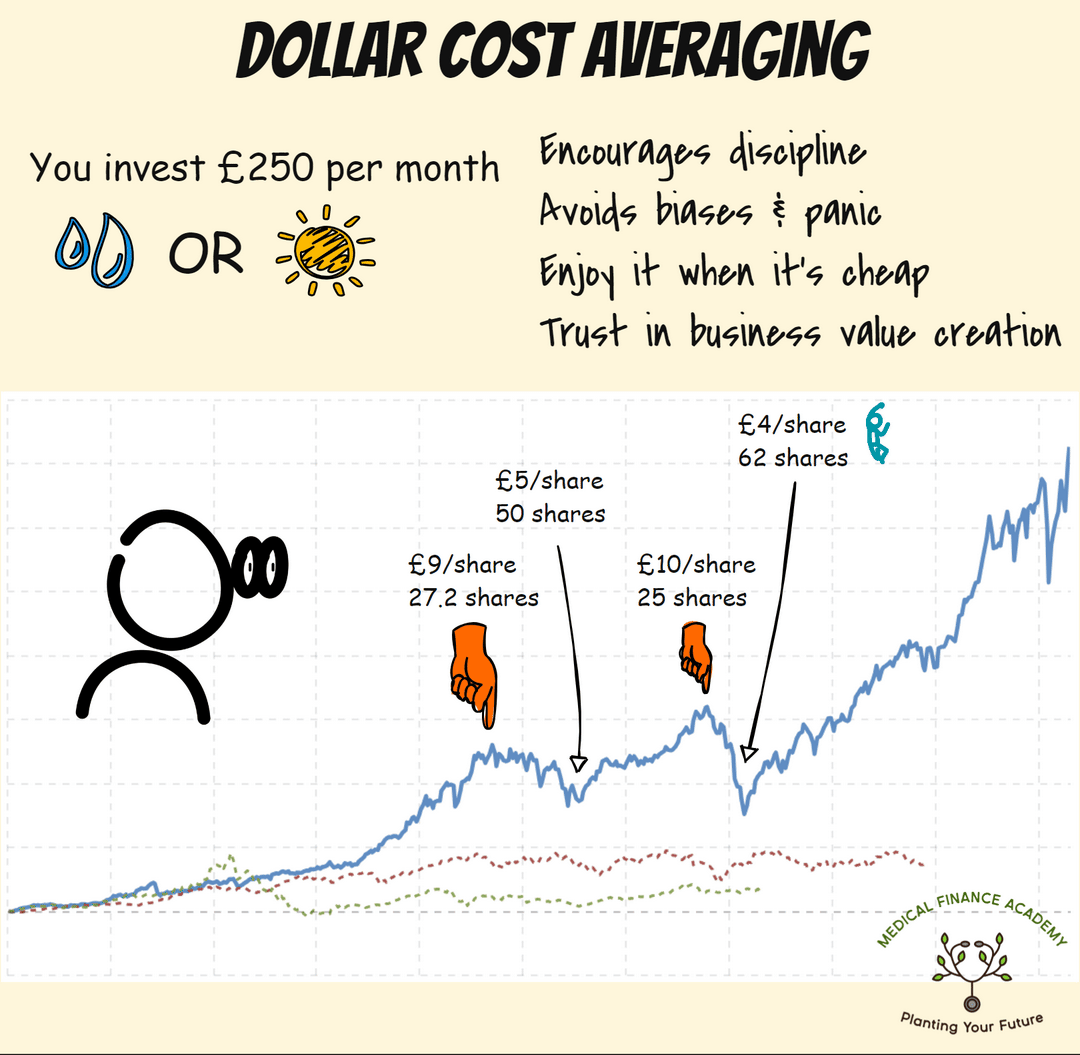Don't Panic! From Market Crash to Cash: Transforming Volatility into Value with Smart Investing Strategies & Emotional Intelligence 💰
- Simon Wong

- Apr 26, 2025
- 6 min read
Updated: May 21, 2025
Ever felt like the stock market is speaking a language you just can’t understand? You're not alone! As healthcare heroes, your days are filled with life-saving decisions, not deciphering financial jargon. But what if I told you that harnessing the chaos of market drawdowns with a bit of emotional intelligence could lead you to EARLIER financial independence and beyond?
Let’s peel back the layers of stock market volatility, where inevitable market corrections and bear markets (means stock market drop) are not your foes but rather your allies in building long-term wealth. Like a healthy lifestyle, smart investing is all about discipline, patience, and a little bit of humour! Ready to make your hard-earned money work for you while you sleep? Let's dive in! 💪💰
Embracing Market Corrections
Market corrections can seem intimidating, but they are a natural part of the investing landscape. Understanding and embracing them is essential for long-term success. By recognizing the inevitability of these events, once you accept that we can't get away without stock market crashes, you can prepare to capitalize on the opportunities they present.
Make stock market fluctuations work to your advantage
Understanding the Inevitable
Market corrections, typically defined as a drop of at least 10% in stock value, happens roughly every two years. They are not a sign of the market's collapse but rather a normal cycle.
During a correction, stocks that seem overvalued often adjust to more realistic levels. This correction prevents the market from being driven by excessive human exuberance, over-excitement in the stock market. As NHS healthcare professionals, understanding this can help in making informed decisions and forming better strategies, rather than reacting impulsively.
The key takeaway is that corrections are not your enemy. They are an expected event. By preparing for them, you can avoid panic and instead use them to your advantage.
Opportunities in Market Drawdowns
Peter Lynch, one of my favourite renowned investor, author of the brilliant book One Up On Wall Street viewed these as chances to buy individual stocks or more shares of the market at a bargain.
You should assess the whole market fundamentals. If the fundamentals remain strong, a lower stock price actually represent a buying opportunity.
Diversify your investments. Spread risk by investing in different sectors or asset classes via index funds, ETFs and REITs. Keep a long-term perspective. Focus on potential growth over years, not days.
During drawdowns, remember that not all price drops reflect the inherent value of a company. I mean, just using common sense, do you really believe that all 500 companies listed in the US S&P500 stock market index all dropped in performance all on the same week of the market crash? This is where emotional intelligence and a clear strategy come into play, allowing you to make rational investment decisions.
Remember my previous blog post 'Price vs Value' (click on link below 👇), I stressed the importance of Warren Buffet's quote, 'Price is what you pay, Value is what you get'. Other than everyday purchases, this quote rings even more true with regards to stock investing.
Stock price is simply how much other traders wish to pay for, it does not always correlate to the fundamental valuation of the business. Yes in the long term it should, but not always.
In essence, seeing corrections/downturns as opportunities aligns with the idea of Buying low and Selling high, a fundamental principle in investing.
Avoid Playing the Trader's Game
Many investors fall into the trap of trying to time the market, acting more like traders than long-term investors. This approach can lead to stress 🤬 and financial losses 🔥 due to unpredictable market swings. Trust me, no one can predict these crashes consistently, if we can, then surely we are all billionaires by now.
Avoid the trader's game by focusing on investment fundamentals and long-term objectives. Resist the temptation to make rash decisions based on market fluctuations. The market's short-term unpredictability makes timing attempts risky and often unproductive.
Instead of chasing trends, concentrate on building a diversified portfolio and lifestyle strategies that maximise investments. This strategy not only minimizes risk but also allows for growth over time.
Mastering Patience and Emotional Intelligence
Emotional intelligence is critical. Successful investing is not about quick gains but about long-term growth. By focusing on the broader picture and ignoring daily market noise, you can achieve financial independence through steady compounding.
Consider the historical performance of the stock market. Despite temporary 'crashes', it has consistently trended upward over decades. This graph I created shows what happens to £1000 invested back in 1990 on the MSCI World Index WITHOUT any further investments or contributions.

Despite all disasters we have witnessed, thinking everything is about to end, compound growth of business value creation continued.
Dollar-Cost Averaging Benefits
Dollar-cost averaging is an effective strategy for reducing the impact of market volatility on investments. This involves investing a fixed amount regularly, regardless of market conditions. I will be writing a separate piece about the power of dollar cost averaging for us everyday NHS staff.
👉 Consistency over time: Regular investments reduce the impact of market fluctuations.
👉 Lower average cost: Buying more shares when prices are low and fewer when prices are high can lower the average cost per share over time.
👉 Reduced emotional stress: The fact that you don't the need to 'time' the market. Makes it close to stress-free. It takes any thinking or pre-planning out of the picture!
Dollar-cost averaging allows you discipline to build your portfolio gradually and consistently.
This is a video of Jack Bogle, the Godfather of Vanguard Index investing, explaining the power of regular contributions into the stock market.
Capturing more stocks when market crashes
Avoiding expensive stocks and losses during unpredictable crashes.
Long-Term Compounding Growth
Consider this: An investment that consistently grows, even at a modest rate, can significantly increase in value over decades. This is the essence of compounding—growth on top of growth. That is how you 'Make Money When You Sleep'.
To leverage compounding:
✅ - Start early - Time is your ally; the earlier you start investing, the more you benefit from compounding.
✅ - Reinvest dividends - Maximize growth by putting earnings back into your investments.
✅ - Stay consistent - Regular contributions enhance the compounding effect.
Through disciplined investing and allowing investments to compound over time, you get to buy your time back, having less years of having to work, being financially independent earlier.
At Medical Finance Academy, I provide 1-to-1 in-person tailored coaching service to educate you on everyday financial literacy, introducing you to the world of asset allocation and generational wealth.
I am Simon Wong, a Urology registrar & money enthusiast working in the NHS.
As an investor and money enthusiast for over 15 years, and a proud father of 2 teenage boys, I have made all the money mistakes one needs to experience in a lifetime. The subsequent corrections after intense studying and reading has completely altered me and my family's path to financial independence.
I wish someone could have sat me down and taught me all this 20 years ago! Now I have compacted all my knowledge & experience into a Simple Framework that could be easily adapted by anyone working in the NHS.
This is the Path of Least Resistance to fast-track you through your financial journey!
Regain your own control of your financial freedom, and ultimately TIME!
I will empower you to build a Self-managed Low cost, Low risk and Low stress Investment asset portfolio, accumulating assets through time, making money work for you, whilst you continue to provide your service & skills in the NHS.
Topics covered in the Medical Finance Academy coaching:
Educating you on the financial system in the UK
Understanding the financial requirement to reach financial independence/retirement/financial freedom
The importance of, and how to get to your 'F*** You Money'
Debunk any common misconceptions of money management and investing
Highlight many Unspoken Issues with Our NHS Pay and money challenges that everyone will face with a career in the NHS
Teaching the variety of investment assets available for everyday tax-paying working people in UK, and why some assets may be more suitable for wealth building over others.
Learn the difference in Good vs Bad debt
Strategies in debt management
Optimising credit management to Improve Credit Score
Setting up the all-important Emergency Fund
Setting up Zero-based budgeting, putting every penny to work
Understanding and getting comfortable with the stock market
Education in Fundamentals of stock market investing
How to choose between different savings/investment accounts
Improving Tax efficiency whilst optimising returns in the UK banking system
Understanding and maximising your NHS Pension
Decipher Psychology of Money with establishing good money discipline and habits
Importance of Avoiding lifestyle inflation and the mathematics behind it, not letting your new money journey justify your high spending
Create an All-weather asset portfolio with the lowest-possible risk, lowest-possible cost/fees and lowest possible emotional stress to build generational wealth through time to achieve Ultimate Financial Independence















Comments